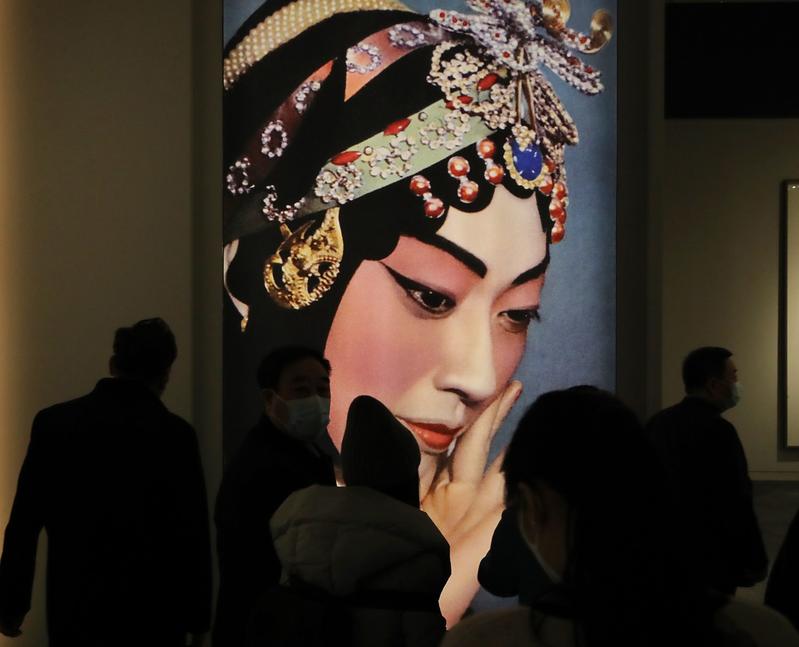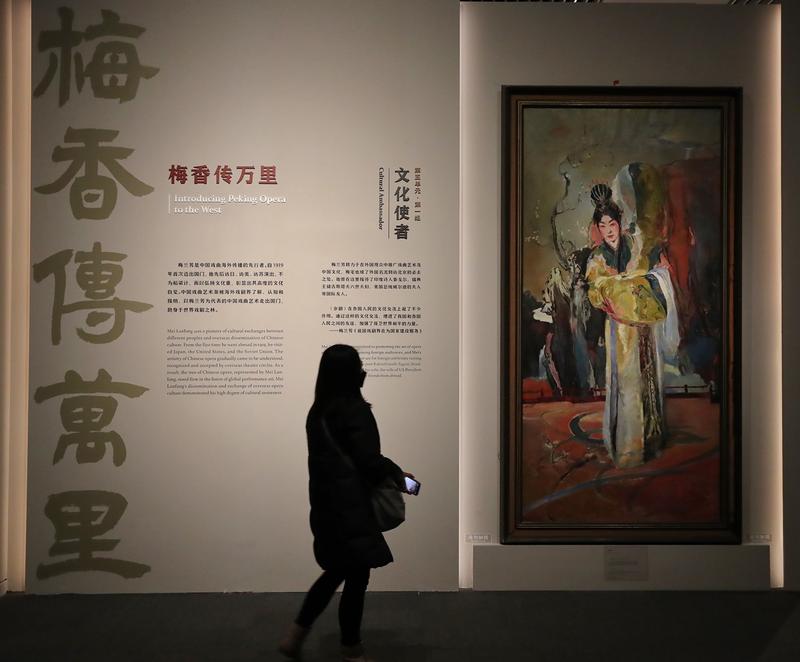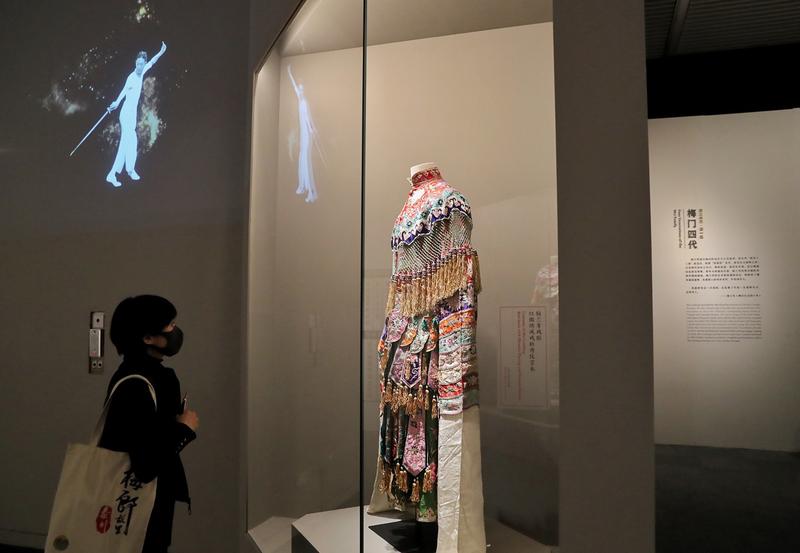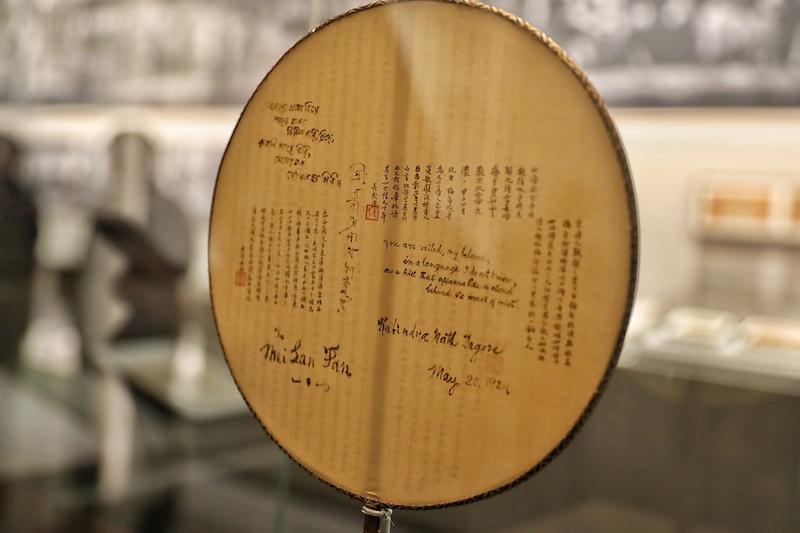A long-term exhibition has been unveiled in honor of Peking Opera master Mei Lanfang, Lin Qi reports.
 A picture of Mei Lanfang in Peking Opera costume attracts visitors at the show. (JIANG DONG / CHINA DAILY)
A picture of Mei Lanfang in Peking Opera costume attracts visitors at the show. (JIANG DONG / CHINA DAILY)
Indian poet and philosopher Rabindranath Tagore's visit to China in 1924 during which he gave lectures and met social luminaries is known to many in the country. However, few may know Tagore composed a poem, in the Bengali language, after seeing a performance by the Peking Opera master Mei Lanfang.
The poem reads, "You are veiled, my beloved, in a language I do not know. As a hill that appears like a cloud behind its mask of mist."
You are veiled, my beloved, in a language I do not know. As a hill that appears like a cloud behind its mask of mist.
Rabindranath Tagore, Indian poet and philosopher
It was on May 20. Tagore was warmly received at Mei's residence in Beijing. Impressed by the host's art and charisma, Tagore wrote the poem, using a Chinese brush pen and ink on a moon-shaped fan as a gift of farewell, and added an English translation and read it to Mei and other guests. These included Liang Qichao, the noted social activist, and Lin Changmin, the prominent politician and scholar.
Lin then wrote down on the fan his translation of the English part in Chinese, in a classical literary style.
The fan has been preserved through the decades. It now makes a rare public outing as part of the display at Mei Lanfang: His Art, His Life, a long-term exhibition at the National Museum of China.
 Mei Lanfang: His Art, His Life, an exhibition at the National Museum of China in Beijing, features a painting, Goddess of the River Luo, which depicts the Peking Opera maestro playing the lead role in one of his signature works. (JIANG DONG / CHINA DAILY)
Mei Lanfang: His Art, His Life, an exhibition at the National Museum of China in Beijing, features a painting, Goddess of the River Luo, which depicts the Peking Opera maestro playing the lead role in one of his signature works. (JIANG DONG / CHINA DAILY)
The fan is shown side by side with a 3-meter-high oil painting, Goddess of the River Luo, which depicts Mei playing the lead role in one of his signature works. It was produced by Nandalal Bose, the pioneering figure of modern Indian art, during his visit to China along with Tagore.
Some 400 objects and hundreds of stage photos of Mei are on show at the exhibition to trace how he turned the family undertaking of performing Peking Opera into a great duty, preserving this cultural heritage and introducing it to the world.
Liu Zhen, head of the Mei Lanfang Memorial Museum, says it took them over one and a half years to mount this exhibition, with the aim to present a "vivid, admirable and respectable image" of the Peking Opera maestro.
Mei Lanfang was raised in a family of opera performers including his grandfather, Mei Qiaoling, who was depicted in a renowned ink-color painting, Thirteen Stars of Tongzhi and Guangxu Reigns of the Qing Dynasty (1644-1911). The collective portrait made in the late 19th century features 13 singers who lived in the late 19th century and early 20th century and contributed to the foundation of Peking Opera. It is on show at the current exhibition.
 A costume worn by Mei Lanfang is on display. (JIANG DONG / CHINA DAILY)
A costume worn by Mei Lanfang is on display. (JIANG DONG / CHINA DAILY)
Mei Lanfang did much more to expand the family heritage. He developed a highly expressive performing style of playing female lead roles with vigor, refinement and grace, and based on that he created the Mei school. Its influence spread far and wide as it produced generations of excellent singers. And he reformed the performance, dress and stage setting to give this operatic tradition a modern touch, building a fan base at home and abroad.
Mei Lanfang was among the first to bring Peking Opera to the international arena. He visited and performed in Japan, the United States and other countries where he created a stir. He was thereafter viewed as an ambassador of Chinese culture and the first Chinese star to gain international influence.
Liu says by making Chinese opera "go global", Mei Lanfang sealed a role of importance in the exchange of art and culture between China and the world and was truly a people's artist to achieve cultural confidence.
 A fan with Indian poet and philosopher Rabindranath Tagore's poem in praise of Mei Lanfang. (JIANG DONG / CHINA DAILY)
A fan with Indian poet and philosopher Rabindranath Tagore's poem in praise of Mei Lanfang. (JIANG DONG / CHINA DAILY)
Items on show not only reflect the far-reaching popularity Mei Lanfang enjoyed during his tours abroad but also his dedication in bringing the best of Chinese art and culture to an international audience.
For example, the introductory material has information on how Mei Lanfang and his peers such as Qi Rushan, a playwright, prepared for his first visit to the US in 1930. This includes English texts and drawings to explain the singing, movements and dress of Peking Opera. The programs include a special show in which Mei performed different dances from various operatic pieces, a suggestion he took from US dramatists and Chinese intellectuals.
Excerpts from Mei's diaries of his US tour are also on display in which the master saw his work there as "an opportunity to serve my country... and to make them (people in the US) know about the depth and scope of our culture, as well as the greatness of our art".
Contact the writer at linqi@chinadaily.com.cn


